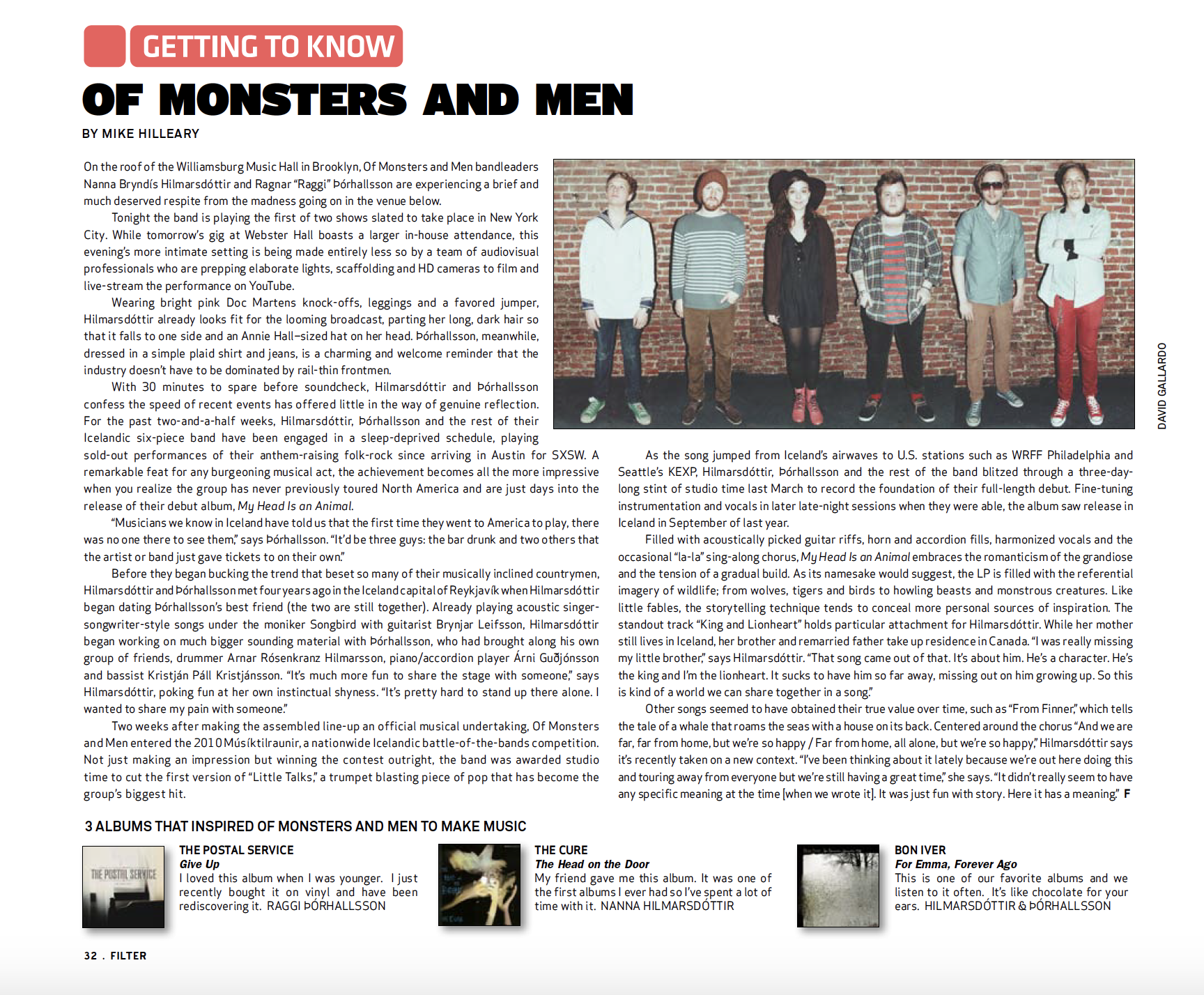Filter, Issue 48
On the roof of the Williamsburg Music Hall in Brooklyn, Of Monsters and Men bandleaders Nanna Bryndís Hilmarsdóttir and Ragnar “Raggi” þórhallsson are experiencing a brief and much deserved respite from the madness going on in the venue below.
Tonight the band is playing the first of two shows slated to take place in New York City. While tomorrow’s gig at Webster Hall boasts a larger in-house attendance, this evening’s more intimate setting is being made entirely less so by a team of audiovisual professionals who are prepping elaborate lights, scaffolding and HD cameras to film and live-stream the performance on YouTube.
Wearing bright pink Doc Martens knock-offs, leggings and a favored jumper, Hilmarsdóttir already looks fit for the looming broadcast, parting her long, dark hair so that it falls to one side and an Annie Hall–sized hat on her head. þórhallsson, meanwhile, dressed in a simple plaid shirt and jeans, is a charming and welcome reminder that the industry doesn’t have to be dominated by rail-thin frontmen.
With 30 minutes to spare before soundcheck, Hilmarsdóttir and þórhallsson confess the speed of recent events has offered little in the way of genuine reflection. For the past two-and-a-half weeks, Hilmarsdóttir, þórhallsson and the rest of their Icelandic six-piece band have been engaged in a sleep-deprived schedule, playing sold-out performances of their anthem-raising folk-rock since arriving in Austin for SXSW. A remarkable feat for any burgeoning musical act, the achievement becomes all the more impressive when you realize the group has never previously toured North America and are just days into the release of their debut album, My Head Is an Animal.
“Musicians we know in Iceland have told us that the first time they went to America to play, there was no one there to see them,” says þórhallsson. “It’d be three guys: the bar drunk and two others that the artist or band just gave tickets to on their own.”
Before they began bucking the trend that beset so many of their musically inclined countrymen, Hilmarsdóttir and þórhallsson met four years ago in the Iceland capital of Reykjavík when Hilmarsdóttir began dating þórhallsson’s best friend (the two are still together). Already playing acoustic singer-songwriter-style songs under the moniker Songbird with guitarist Brynjar Leifsson, Hilmarsdóttir began working on much bigger sounding material with órhallsson, who had brought along his own group of friends, drummer Arnar Rósenkranz Hilmarsson, piano/accordion player Árni Gujónsson and bassist Kristján Páll Kristjánsson. “It’s much more fun to share the stage with someone,” says Hilmarsdóttir, poking fun at her own instinctual shyness. “It’s pretty hard to stand up there alone. I wanted to share my pain with someone.”
Two weeks after making the assembled line-up an official musical undertaking, Of Monsters and Men entered the 2010 Músíktilraunir, a nationwide Icelandic battle-of-the-bands competition. Not just making an impression but winning the contest outright, the band was awarded studio time to cut the first version of “Little Talks,” a trumpet blasting piece of pop that has become the group’s biggest hit.
As the song jumped from Iceland’s airwaves to U.S. stations such as WRFF Philadelphia and Seattle’s KEXP, Hilmarsdóttir, þórhallsson and the rest of the band blitzed through a three-day-long stint of studio time last March to record the foundation of their full-length debut. Fine-tuning instrumentation and vocals in later late-night sessions when they were able, the album saw release in Iceland in September of last year.
Filled with acoustically picked guitar riffs, horn and accordion fills, harmonized vocals and the occasional “la-la” sing-along chorus, My Head Is an Animal embraces the romanticism of the grandiose and the tension of a gradual build. As its namesake would suggest, the LP is filled with the referential imagery of wildlife; from wolves, tigers and birds to howling beasts and monstrous creatures. Like little fables, the storytelling technique tends to conceal more personal sources of inspiration. The standout track “King and Lionheart” holds particular attachment for Hilmarsdóttir. While her mother still lives in Iceland, her brother and remarried father take up residence in Canada. “I was really missing my little brother,” says Hilmarsdóttir. “That song came out of that. It’s about him. He’s a character. He’s the king and I’m the lionheart. It sucks to have him so far away, missing out on him growing up. So this is kind of a world we can share together in a song.”
Other songs seemed to have obtained their true value over time, such as “From Finner,” which tells the tale of a whale that roams the seas with a house on its back. Centered around the chorus “And we are far, far from home, but we’re so happy / Far from home, all alone, but we’re so happy,” Hilmarsdóttir says it’s recently taken on a new context. “I’ve been thinking about it lately because we’re out here doing this and touring away from everyone but we’re still having a great time,” she says. “It didn’t really seem to have any specific meaning at the time [when we wrote it]. It was just fun with story. Here it has a meaning.” F

